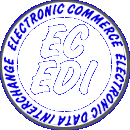 FREQUENTLY ASKED QUESTIONS
What is Electronic Commerce? Electronic Commerce is the application of advanced information technology to increase the effectiveness of the business relationships between Trading Partners. It involves the buying and selling of goods and services on the Internet (especially the World Wide Web), and the paperless exchange of business information using Electronic Data Interchange (EDI) and related technologies. Electronic Commerce means doing business electronically: using information and communications technology to do business with consumers, with other businesses, and even within the boundaries of the firm. It is an integrative concept, designed to draw together a wide range of business support services, including inter-organizational email; directories; trading support systems for commodities, products, customized products and custom-built goods and services; ordering and logistic support systems; settlement support systems; and management information and statistical reporting systems. In short, Electronic Commerce is commerce enabled by Internet-era technologies such as:
Why use Electronic Commerce?
Reduced acquisition times and costs Lower prices for goods and services Expanded number and quality of suppliers Increased buyer productivity Better management information Better inventory control
Reduced time to market Improved operating efficiencies Improved product quality at reduced cost Improved payment process Expanded number of customers
What is Electronic Data Interchange? Electronic Data Interchange (EDI) is the computer-to-computer exchange of business information by means of standardized transaction sets developed and used over the years in the private sector. It is a standard data format for exchange of business data. Electronic Data Interchange (EDI) involves the exchange of structured data by agreed message standards between computer systems of trading partners by electronic means. The use of structured data refers to a precise, recognized and accepted method of assembling data. Such data includes Item Codes, Customer Reference, Delivery Point and Unit Price which come together to form a Purchase Order or Invoice. An EDI message contains a string of data elements called Data Segment. One or more data segment form a transaction set which is the EDI unit of transmission. Parties exchanging EDI transmissions are referred to as Trading Partners. EDI messages can be encrypted or decrypted.
What is Emall? Electronic Mall (Emall) is an electronic shopping center designed to allow buyers to search and shop on the Internet for desired products and information.
http://tww.ectb.ctc.com/xfer/callihan/emall_demo/
What is DISA? DISA is the Defense Information Systems Agency (DISA) and their mission is "To plan, engineer, develop, test, manage programs, acquire, implement, operate, and maintain information systems for C4I and mission support under all conditions of peace and war." The Defense Information Systems Agency is transforming the way Department of Defense personnel move, share, and use information. As manager of the Defense Information Infrastructure (DII), DISA integrates hardware and software and is constructing a common operating environment to sustain war-fighters need for information at any given time or place. Additionally, DISA is aggressively working with DOD Agencies, the military departments, and other federal agencies, and industry to fix potential problems associated with the coming of Year 2000.
http://www.disa.mil/
What is AECRC? The Atlanta Electronic Commerce Resource Center is one of sixteen branches of the Electronic Commerce Resource Centers in the US. It is jointly operated by Georgia Institute of Technology and Clark Atlanta University as a federally funded, Department of Defense sponsored resource center providing training, consultation, and technical support to Government, Small Business, and Prime Contractors, in Electronic Commerce related topics. Each Regional ECRC conducts Outreach, Education & Training, Consultation, and Technical Support activities to identify and meet individual customer needs. The ECRC Program acts as a catalyst for a vast network of small and medium-sized enterprises to adopt electronic commerce. These enterprises use advanced electronic commerce technologies to provide the Department of Defense and other federal organizations with low-cost, high-quality products, goods, and services. The ECRC contract is operated by Concurrent Technologies Corporation (CTC), sponsored by the Deputy Undersecretary of Defense for Logistics and administered by the Defense Logistics Agency.
http://www.ecrc.ctc.com/amap.htm
What are HBCUs? Historically Black Colleges and Universities (HBCUs) are post-secondary academic institutions founded before 1964 whose educational mission has historically been the education of Black Americans. Located primarily in the Southeastern United States, there are about 117 HBCUs in existence, comprising a mix of community and junior colleges, four-year colleges and universities, and public and private institutions.
http://eric-web.tc.columbia.edu/hbcu/
What are M.I.s? Minority Institutions are Institutions verified by the Secretary of Education to meet the criteria set forth in 34CFR 637.4, including Hispanic-serving institutions as defined by 20 USC 1059c (b).
For further response to questions please contact:
Ms. Yvonne Chatmon CAU/HECI Help Desk Phone: (404)880 6626 Fax: (404)880 6735
Email: ychatmon@visidel.cau.edu
|